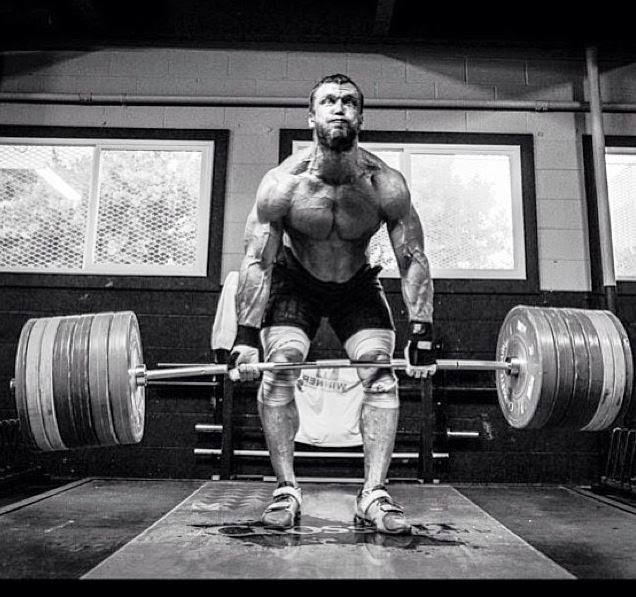You don't have to spend much time in the sport of weightlifting before you understand in your bones the importance of squatting to success in the sport. In every training hall you'll hear talk of impressive back squat weights. On weightlifting message boards people dissect and argue every conceivable permutation of squatting programs like the Texas Method or Russian Squat or Smolov. There are nearly as many Youtube videos of world class lifters back squatting as there are of them doing the lifts. The message is clear: squat or suck. What I almost never hear is mention of the importance of the deadlift to successful weightlifting.
For some reason the deadlift gets short shrift in the sport. Coaches and lifters are always trying to substitute pulls in their programs and refer to them as "strength building" exercises. Nonsense. Pulls, the bastardized hybrid of deadlifts and full lifts, have been rejected by many good coaches because they do not duplicate the speed and technique of a classic lift, and are not heavy enough to build great posterior chain strength.
"But won't heavy deadlifts make my pull slow?" No. Hell no. Did you ever see anyone fly out of the hole with a new PR single in the back squat? Did anyone ever say that squatting heavy makes a lifter slow? No, because we'd all look at that person as if they were the dumbest human in the room. Back squats make you STRONG, and strong matters in weightlifting.
Deadlifts not only make you STRONG, but they do a few other good things for you, too. Early in a lifter's career, deadlifts teach proprioceptive awareness of the "locked down" back position so important to the classic lifts. The spinal erectors, lats, all the small muscles around the shoulder blades and the core have to be properly contracted and held in that position throughout the pull. The lifter has to feel that to hold it. Deadlifting with precise form teaches the lifter to feel that position and, more important, hold it while moving. Early on I never have a lifter do deadlifts with more weight than they can hold perfectly for a triple. The weights can start to go up as holding that position becomes ingrained habit.
Deadlifting as heavy as technique allows also teaches lifters how to strain. Someone new to lifting does not know the limits of their body. The mind says "heavy" at far lighter weights than the body can actually handle. Deadlifts teach a new lifter to strain against a weight and stay with it better than any exercise I've used.
I can hear the protests now. "But heavy deadlifts will mess up the technique of the classic lifts!" I didn't say powerlifting deadlifts, did I. Deadlifts for weightlifters should all be done with exactly the same form as a pull, but heavier and necessarily slower. Above the knees the lifter should simply stand up over his or her heels, attempting to push the hips as high as they can. I have a couple lifters who even "pop" their hips up at the end.
How heavy is heavy for deadlifts? I don't see a reason to go over 125% to 135% of a lifter's best clean for much of the year. I have my lifters go for a top triple, which keeps the weights in that range. They do this once a week and alternate clean and snatch deadlifts, one week CDLs and the next SDLs. If it's far out from a meet and the classic lift volume is not high, they can go for a big single.
I had visiting 94 kilo lifter a few months back who could pound out sets of five with 225kg in the back squat, but his back gave off the floor attempting a 125 snatch and 165 clean. I had him start deadlifting to teach him how to better hold back position off the floor and make his back stronger. His back position quickly improved and he just recently hit a PR 131 snatch and PR 172 clean. He always had the leg strength to do those lifts, but lacked the back strength and proprioceptive awareness of his back position to hit them.
But what about powerlifting style deadlifts I alluded to earlier? I said that the deadlifts should mimic the form of the lifts for most of the year. But far out from a competition, there is nothing wrong at all with hitting a cycle of stupid-heavy powerlifting style deadlifts, with mixed grip and imperfect back position—as long as the lifter has a solid strength base and history of deadlifting with very good Olympic lifting form. Keep the volume very low, but the intensity high. High volume deadlifts will fry you faster
Deadlifts are one of the best overall strength building exercises you can do besides squats. Deadlifts will not make you slow. They will make you strong. And as grandpa used to say, "It's good to be strong."
- Coach Dan Bell will be teaching the upcoming Vulcan Weightlifting Seminar at CrossFit LKN in Huntersville, North Carolina, July 26-27. For more information or to register go to: http://www.vulcanstrength.com/Vulcan-Weightlifting-Technique-Seminar-p/vwltech1.htm

